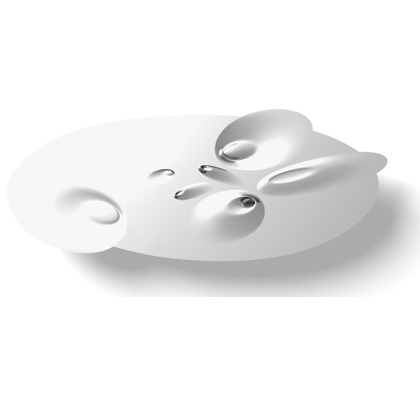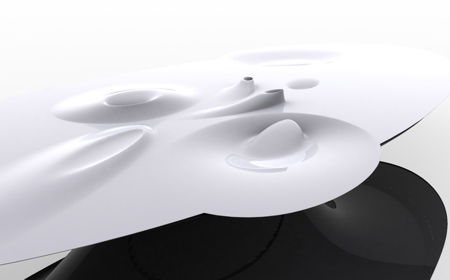
Crater by Zaha Hadid
This the third of the four new pieces Zaha Hadid is launching at Design Miami/Basel in Switzerland next week.

Crater is a table created for David Gill Galleries that features objects such as vases and bowls integrated into the tabletop and appearing as craters in the surface.
Full details from the architect below:
--
Crater for David Gill Galleries
Booth 15, Design Miami/Basel, Markthalle, Viaduktstrasse 10 CH-4051.
June 13th-17th
Design: Zaha Hadid with Patrik Schumacher
Project Designer: Saffet Kaya Bekiroglu
Design team: Chikara Inamura, Chrysostomos Tsimourdagkas
Crater represents the latest manifestation of Zaha Hadid’s 30-year exploration and research that continues to challenge our preconceptions of design. With Crater, Hadid’s experimentation leads to an entirely unique line of questioning that explores the relationship between the table and disparate objects placed upon its surface.
Hadid has reduced the substance of the table and these objects on its surface into the purest of forms – an absolute expression of
function that liberates our expectations and allows us to reconsider this relationship. She then reconnects each function with a sensual fluidity generated by her dialogue of smooth transitions between elements.
We witness objects emerging from the Crater’s surface that appear definite, yet when examined from an alternative perspective,
these bowls or candleholders have no independent solidity – they are simply integral elements within continuous topology of the
table’s surface. Hadid’s overriding logic of morphological conception enables us to embrace such connections.
The field conditions that define the table’s surface (creating the objects we had previously assumed as separate entities) are applied to three singularities beneath this same surface to form the table’s signature. Three craters are molded by invisible forces into the complex curvilinear geometry mastered by Hadid – a design language that incorporates the radical aesthetics of the Russian Avant-Garde together with a fluidity reminiscent of Expressionism. Two of these craters extend reassuringly to the floor. The third crater is suspended in space, and clearly a bowl. With this truncation, we are, once again, provoked to question the separation between table and object.
An aspect of Hadid’s vision is her interest in the rigorous interface between cutting-edge design and current material technologies. Such a process often results in unexpected and dynamic forms. Using the latest developments in three dimensional design software, Zaha Hadid’s experimentations into the unique properties of aluminium have created the fluid and enigmatic forms of Crater.